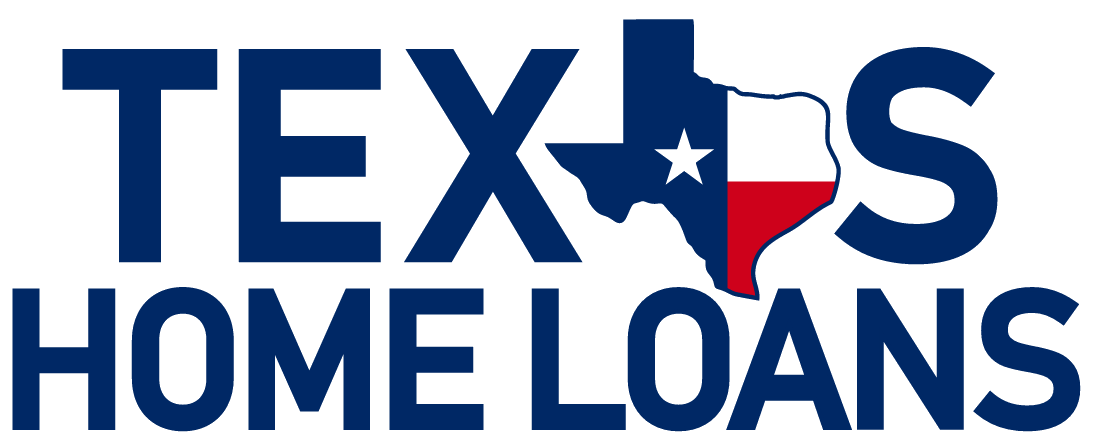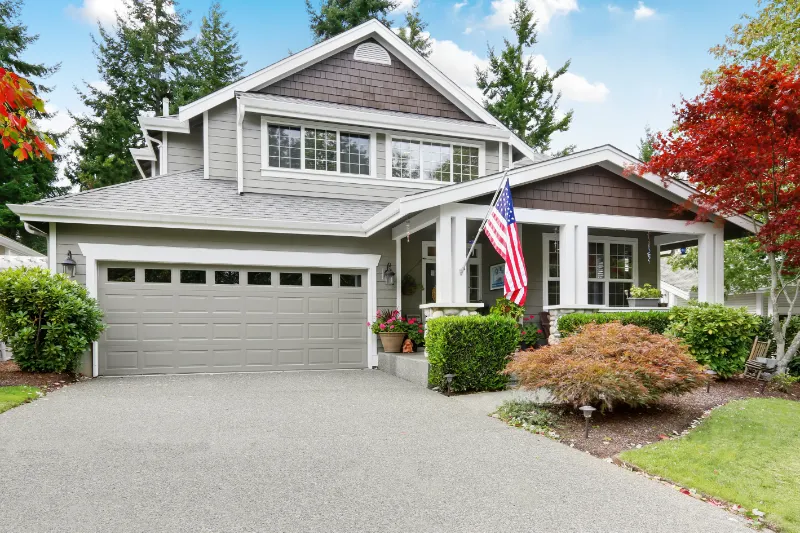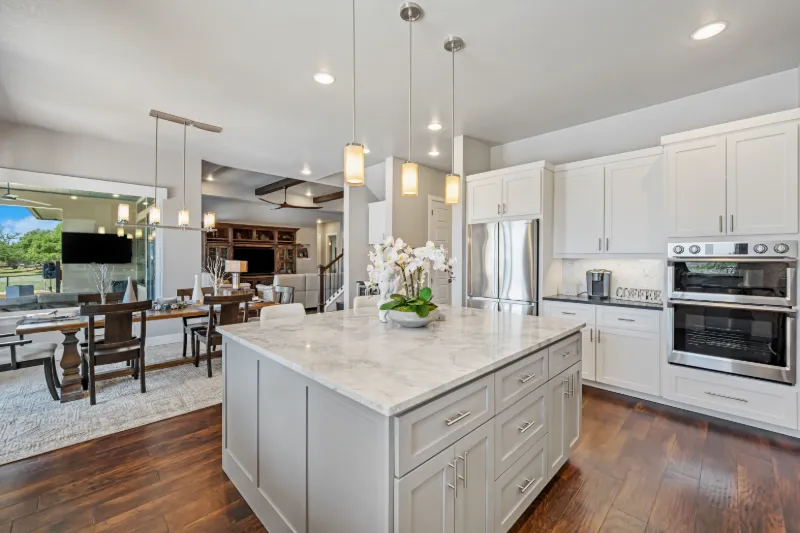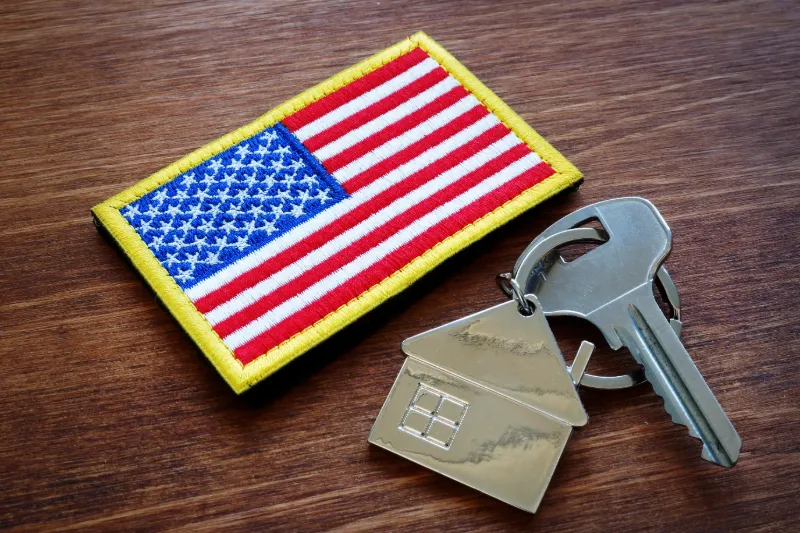When it comes to financing a home in Texas, I've seen many buyers struggle with…
VA Home Loan vs. Conventional: Choosing the Right Option
Navigating home financing can feel confusing. You might choose between a VA home loan and conventional loan. It’s vital to grasp these choices well to make a smart decision aligned with your homeownership plans. VA home loans, supported by the Department of Veterans Affairs, have low rates and need no down payment for eligible veterans. In contrast, conventional loans are for non-military buyers and have different rules for eligibility, down payments, and mortgage insurance. By understanding these differences, you can select the right option for buying a house in Texas.
Exploring Each Loan Option
VA Home Loans are government-backed loans for eligible veterans or their spouses, offered by the Department of Veterans Affairs. These loans often feature competitive interest rates, no requirement for private mortgage insurance, and may allow for a $0 down payment. Conversely, conventional loans are not guaranteed by a governmental entity and typically require at least a 3% down payment. Unlike VA loans, conventional loans may necessitate private mortgage insurance if the down payment is less than 20%. It’s essential for potential homebuyers to understand the distinctions between these loan types to determine the best financing solution for their specific needs.
What is a VA Home Loan?
A VA Home Loan is a mortgage option available to veterans and active-duty service members, offering benefits like no down payment and lower interest rates. It’s backed by the Department of Veterans Affairs to help eligible individuals achieve homeownership.
What is a Conventional Loan?
A conventional loan is a mortgage not guaranteed or insured by the government. It typically requires higher credit scores and down payments compared to VA loans. Conventional loans offer various term options and competitive interest rates for qualified borrowers.
Eligibility Requirements for Homebuyers in Texas
For Texas homebuyers, understanding the eligibility requirements is crucial when considering a VA home loan or a conventional loan. VA Loan eligibility is determined by days of active service, while Conventional Loan criteria typically focus on credit scores and debt-to-income ratios. VA Loans often have more flexibility for service members and veterans, whereas Conventional Loans are open to civilian homebuyers and independent contractors. Down payments vary, with VA Loans potentially requiring no down payment for eligible borrowers, unlike Conventional Loans which usually require a minimum down payment. Exploring these requirements can help you decide which loan aligns best with your situation and homeownership goals.
VA Loan Eligibility Criteria
To be eligible for a VA home loan, individuals must be veterans, active-duty service members, National Guard members, Reservists, or surviving spouses. They should have completed a certain number of days in active service, depending on the era they served in. A Certificate of Eligibility from the Department of Veterans Affairs is required to prove eligibility. VA loans generally have more lenient credit score requirements compared to conventional loans, making them accessible to more borrowers. Additionally, VA loans often do not require a down payment and may have lower interest rates. Understanding these eligibility criteria can help determine if a VA loan is the right financing solution for you.
Conventional Loan Eligibility Criteria
To be eligible for a conventional loan, lenders typically require a credit score of at least 620, though higher scores may secure better interest rates. Debt-to-income ratio should not surpass 43%, indicating a borrower’s ability to manage monthly payments. Unlike VA loans, conventional loans often demand private mortgage insurance if the down payment is less than 20%. Additionally, a stable income and employment history are crucial factors in determining eligibility for conventional loans. Meeting these criteria is essential for civilian homebuyers seeking conventional financing solutions. Understanding these eligibility requirements can help individuals decide between a VA home loan and a conventional mortgage based on their financial situation and needs.
Pros and Cons of VA Home Loans
Benefits of Choosing a VA Loan
VA loans offer numerous benefits, including competitive interest rates, no need for private mortgage insurance (PMI), and the possibility of no down payment requirements for eligible borrowers. The Department of Veterans Affairs backs VA loans, ensuring favorable terms for service members, veterans, and surviving spouses. Additionally, VA loans typically have lower closing costs compared to conventional loans, easing the financial burden on borrowers. With VA loans, there’s also the flexibility to finance your primary residence, making it an attractive option for military personnel and veterans looking to purchase a home without significant upfront costs. VA loans provide a range of advantages designed to support those who have served their country.
Potential Drawbacks of VA Loans
VA loans come with certain drawbacks to consider. One limitation is the funding fee, which is required for most borrowers unless they have a service-related disability. Additionally, VA loans may have stricter property requirements, limiting the types of homes you can purchase. Another disadvantage is the potential appraisal challenges, as the property must meet specific VA standards. While VA loans offer many benefits, such as no down payment and competitive interest rates, these drawbacks are essential to weigh against the advantages when deciding on the right loan option.
Pros and Cons of Conventional Loans
Conventional loans offer flexibility in terms of property types and loan amounts, making them suitable for various homebuyers. They typically have competitive interest rates, especially for those with excellent credit scores. However, conventional loans often require higher down payments compared to VA loans, which can be a challenge for some buyers. Additionally, conventional loans may necessitate private mortgage insurance if the down payment is less than 20%. While they provide a conventional financing solution for many, these loans may not always be the best option for veterans and active-duty service members due to potentially higher upfront costs and stricter eligibility requirements.
Advantages of Conventional Loans
Conventional loans offer flexibility in terms of funding sources and property types, accommodating various financial situations. They do not have government agency backing, allowing more leeway in approval criteria, especially for non-traditional borrowers. Conventional loans often present competitive interest rates, especially for those with higher credit scores. Additionally, they can be used for primary residences, second homes, or investment properties. Borrowers with excellent credit may benefit from lower interest rates compared to VA loans. This option is particularly advantageous for individuals who do not meet the strict eligibility requirements of VA loans or those seeking a broader range of financing solutions.
Disadvantages of Conventional Loans
Conventional loans typically require higher credit scores and down payments compared to VA loans. They may have higher interest rates, making them less affordable for some borrowers. Private mortgage insurance is often mandatory for conventional loans with less than a 20% down payment, adding to the overall cost. Additionally, conventional loans do not offer the same level of flexibility and benefits that VA loans provide to eligible veterans and service members. For those who may not meet the stricter eligibility requirements or prefer lower initial costs, conventional loans might not be the ideal choice compared to VA home loans.
Financial Aspects: VA Loans vs. Conventional Loans
When comparing VA loans and conventional loans, there are some key financial aspects to consider. These include down payment requirements, interest rates, and mortgage insurance.
Down Payment Requirements
For VA home loans, one of the significant advantages is the flexibility in down payment requirements. Typically, VA loans offer zero down payment options, allowing eligible borrowers to finance up to the full value of their homes without requiring a down payment. This feature can be highly beneficial for veterans, service members, and eligible surviving spouses who may not have substantial savings for a traditional down payment. On the other hand, conventional loans often require a down payment ranging from 3% to 20% of the home’s purchase price. This fundamental difference in down payment requirements can significantly impact the upfront costs associated with obtaining a mortgage, making VA loans an attractive option for those looking to minimize initial expenses.
Interest Rates Comparison
For service members and veterans exploring financing solutions, comparing interest rates between a VA home loan and a conventional mortgage is crucial. VA loans, supported by the Department of Veterans Affairs, often offer competitive interest rates compared to conventional loans. These rates are influenced by factors like the current mortgage interest rate and the VA funding fee. On the other hand, conventional loans sourced from private lenders may have varying rates based on market conditions and the borrower’s financial profile. Understanding these differences can help borrowers make informed decisions based on their unique circumstances and financial goals.
Mortgage Insurance Differences
Mortgage insurance plays a vital role in both VA and conventional loans, yet there are distinct differences worth noting. In VA loans, there is a VA funding fee, acting as an upfront charge to participate in the program and replace the need for private mortgage insurance (PMI). This fee varies based on factors like down payment percentage and whether it’s your first or subsequent use of the VA loan benefit. Conversely, conventional loans typically require PMI if your down payment is less than 20% of the home’s value. PMI can be canceled once you reach a certain amount of equity in your home, a flexibility not found in the VA loan program. Understanding these nuances can help in deciding between the two loan options.
Property Types and Loan Limits in Texas
When considering property types and loan limits in Texas for VA home loans and conventional loans, understanding the distinctions is crucial. VA loans generally offer more flexibility in property types, including primary residences, while conventional loans can be used for various property types, such as primary residences and investment properties. Loan limits differ as well, with VA loans often having higher limits. It’s essential to explore these factors to determine the best option for your specific homebuying needs in Texas.
Property Eligibility for VA Loans
To qualify for a VA loan, the property must meet specific requirements set by the Department of Veterans Affairs. Eligible properties include single-family homes, condos in VA-approved projects, and multi-unit properties up to 4 units if the borrower intends to live in one of them. It’s important to note that VA loans are intended for the borrower’s primary residence. Understanding the property eligibility criteria is crucial when considering a VA loan for home purchase.
Property Eligibility for Conventional Loans
To qualify for a conventional loan, the property must meet certain criteria. Conventional loans are available for various property types, including primary residences, second homes, and investment properties. The property should be in good condition and meet appraisal standards to secure the loan. Additionally, conventional loans have different loan limits compared to VA loans. Understanding the property eligibility requirements for conventional loans is essential when considering this type of mortgage financing.
Frequently Asked Questions
Who is eligible for a VA home loan?
A VA home loan is available to active-duty service members, veterans, National Guard members, Reservists, and some surviving spouses. Eligibility requirements include meeting specific service criteria and obtaining a Certificate of Eligibility from the VA.
What are the closing costs associated with VA Loans vs. Conventional Loans?
Closing costs for VA loans typically include appraisal, credit report, and funding fee. Conventional loans may have appraisal, title search, and origination fees. VA loans limit closing costs, but conventional loans may offer more flexibility. Understanding these costs helps determine the best loan option.
How does my credit score affect my loan options?
Your credit score significantly impacts your loan options. For VA loans, a minimum credit score may be required, while conventional loans offer varied rates based on credit scores. Understanding your score’s influence is crucial for choosing the right loan.
Conclusion
Understanding VA Home Loans and Conventional Loans is important for buying a home. Each has pros, cons, and criteria. Choose based on your needs. Consider benefits, drawbacks, and requirements to make an informed decision that fits your goals. Research, get advice, compare before deciding on your home loan. Your dream home is possible with the right loan choice.






